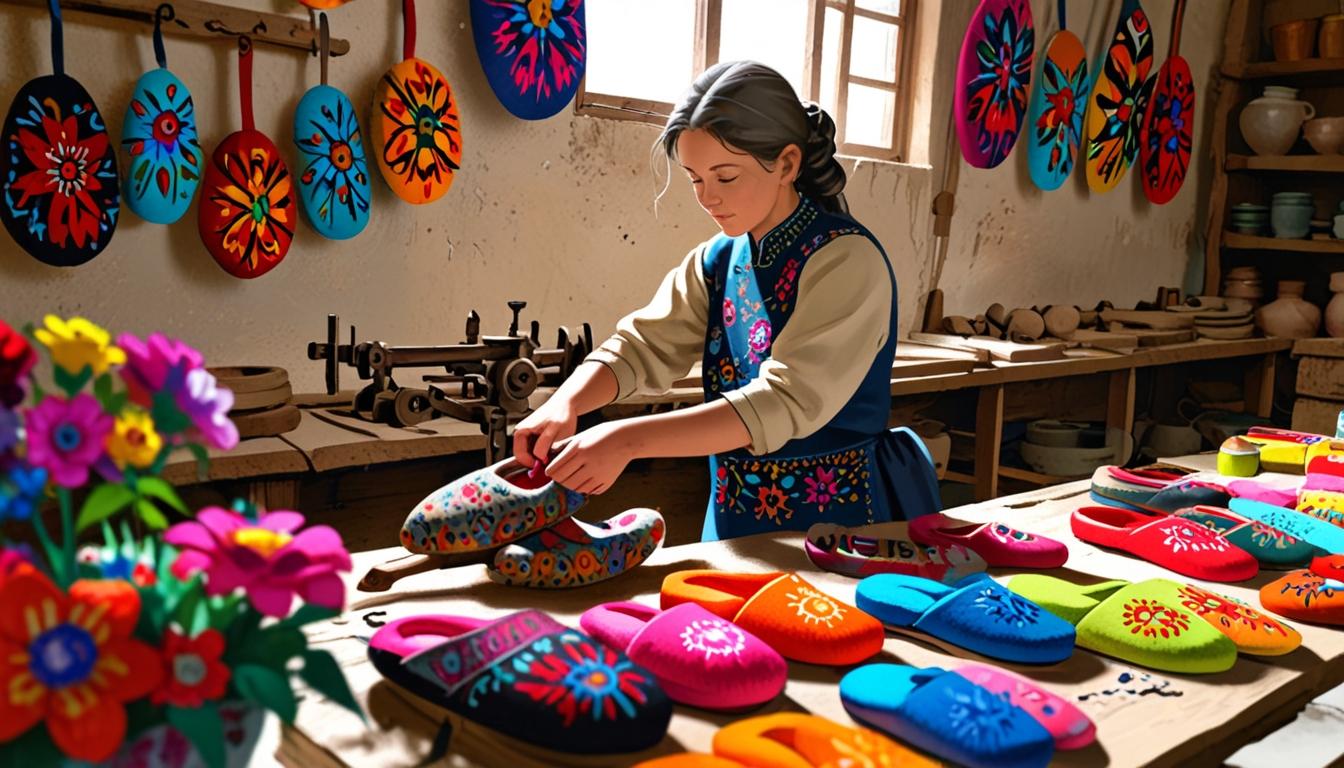The Tumar Art Group navigates the challenges of modern e-commerce while preserving Kyrgyzstan’s rich felt-making traditions amid financial hurdles.
In Bishkek, Kyrgyzstan, the Tumar Art Group is navigating the intersection of traditional craftsmanship and modern e-commerce, all while facing the challenges posed by a rapidly changing economic and technological landscape. Founded in 1998 by sisters-in-law Chinara Makashova and Nazgul Esenbaeva, the company specializes in felted products, drawing upon centuries-old Kyrgyz nomadic traditions. Recently, the group received a surge of Shopify orders, indicating a growing interest in their artisan products, including felted slippers. However, they encountered a significant setback: a $35,000 funding gap after the loss of support from USAID’s green business initiative.
“May our partners have good health. May they be ambitious, and successful, and may their businesses grow,” Makashova expressed a night prior as she ended her day with a prayer. The next morning brought unexpected good news in the form of high-volume orders, making their aspirations to expand their direct-to-consumer web store seem closer to reality.
Located in a factory that blends modernity with traditional elements, Tumar has steadily increased its production capacity thanks to past funding from USAID. The facility features workspaces adorned with geraniums and colorful floor tiles, where artisans use a unique combination of old and repurposed Soviet-era equipment. For instance, they modified a machine retrieved from a scrap heap to press felted slippers, adapting outdated technologies to fit contemporary needs. As Makashova noted, “No one makes this kind of equipment nowadays. It is possible only by special order.”
Kyrgyzstan’s rich history in felt-making dates back 5,000 years, where nomads would use local sheep wool to create goods that were both functional and essential to their way of life. The practice of wet felting, however, faced near extinction in the post-Soviet era until Makashova and Esenbaeva, alongside other women, sought to preserve and revitalize this art form. Today, Tumar employs a combination of handcraft and automated processes to produce not only traditional items like shyrdaks and kalpak hats but also modern footwear.
The changing landscape for Tumar has not only included adapting traditional techniques but also responding to the growing demand for sustainable materials. With the rise of eco-conscious consumerism, their association with online platforms like Shopify has been pivotal, allowing them to reach international markets. However, the absence of reliable payment systems poses a significant barrier. “Payment systems are a very, very big problem,” Makashova explained, highlighting the ongoing issues stemming from Western sanctions on Russia, which complicate banking and transaction processes within Kyrgyzstan’s closely linked financial infrastructure.
Despite the difficulties, Tumar is striving to modernize its operations, including plans for a new website with updated security measures and payment processing capabilities. The growth of their brand, particularly through partnerships established with Kyrgies—a US-based online retailer—has led to a noticeable increase in staff and production capacity.
As of January 2025, Tumar has developed a comprehensive plan to advance its direct-sale capabilities. Unfortunately, this initiative is contingent upon finding new sources of funding after USAID’s withdrawal left them with a critical financial gap. By potentially enrolling in Estonia’s e-Residency program, Tumar hopes to access international payment processing solutions that align with their goals. However, the founders remain aware of the fragile nature of their situation.
At their new wool processing facility, strategic discussions are taking place about expansion and sustainability. There, the team aims to lower waste by processing wool that might otherwise be discarded. They are also exploring innovative product lines, including entirely biodegradable slippers. “We want to open up possibilities for artisans to get new direct online orders,” said Makashova, emphasizing the importance of enhancing quality and consistency in their offerings.
The Tumar Art Group represents a vivid example of how traditional crafts can intersect with modern market demands, showcasing the resilience and ingenuity required to thrive in a complex economic environment.
Source: Noah Wire Services





I found your blog site on google and verify just a few of your early posts. Proceed to maintain up the very good operate. I just extra up your RSS feed to my MSN Information Reader. Seeking forward to studying extra from you afterward!…